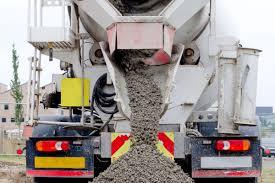Ready-Mix Concrete Market Rising Due To Smart City Developments Globally

The Ready-Mix Concrete Market is witnessing strong momentum as smart city developments gain traction worldwide. These future-ready urban landscapes demand advanced infrastructure, rapid construction timelines, and sustainable materials—making ready-mix concrete (RMC) an indispensable component. From digital highways and transit systems to green commercial towers and resilient housing, RMC’s versatility and efficiency position it as the preferred material of choice in these tech-enabled urban transformations.
Smart Cities and Infrastructure Overhaul
Governments across regions—including the U.S., China, the UAE, and India—have launched ambitious smart city programs to address urban challenges such as congestion, pollution, and resource management. These projects emphasize integrated transport networks, intelligent waste systems, energy-efficient buildings, and digital connectivity—all of which depend on robust infrastructure backbones.
RMC facilitates this transformation by enabling faster, quality-controlled construction for large-scale urban layouts. Its application in roads, metro stations, bridges, smart grids, and IoT-enabled buildings supports the need for both speed and structural integrity, two hallmarks of smart urbanization.
Global Smart City Projects Driving Concrete Demand
Across the globe, prominent smart city developments are boosting demand for RMC:
-
India’s Smart Cities Mission, covering 100 cities, has allocated billions for roads, drainage, flyovers, and integrated housing—all requiring high volumes of ready-mix concrete.
-
NEOM City in Saudi Arabia, a futuristic $500 billion megaproject, is using technology-first infrastructure embedded in concrete modules designed off-site and assembled rapidly on location.
-
Songdo, South Korea, and Masdar City, UAE, are examples of smart urban design where RMC is vital in achieving seamless, interconnected infrastructure with minimal environmental impact.
In each of these cases, RMC provides consistency, reduced construction time, and precision-engineered mixes suitable for complex architectural requirements.
Role of RMC in Tech-Integrated Urban Construction
Smart cities demand new-age construction solutions that blend digital technology with architectural design. Buildings are now integrated with sensors, data-capture points, and adaptive technologies that must be seamlessly embedded during construction.
Ready-mix concrete plays a crucial role in this integration. Its pre-engineered nature allows contractors to control strength, flexibility, and curing timelines while accommodating embedded systems like fiber-optic cabling, geothermal conduits, and smart HVAC frameworks. Moreover, RMC allows for modular and prefabricated elements to be cast in controlled environments—delivering speed without compromising on durability.
Environmental Standards and Sustainability Alignment
Smart city blueprints are closely aligned with green building protocols and climate commitments. The integration of sustainability goals in construction means that only low-carbon, energy-efficient materials are suitable for use. This places green RMC formulations—those containing fly ash, GGBS, recycled water, and alternative binders—at the forefront.
In addition, construction in smart cities is increasingly accompanied by life-cycle analyses (LCAs) and environmental product declarations (EPDs), both of which favor ready-mix concrete due to its adaptability to eco-standards. Producers who innovate in sustainable concrete are gaining preference in procurement processes tied to smart city funding and approvals.
Urban Population Growth Fuels Residential RMC Uptake
Smart cities are also designed to accommodate rapidly growing urban populations, especially in Asia-Pacific, Africa, and the Middle East. As migration patterns favor metropolitan hubs, the need for high-density housing, smart townships, and integrated residential complexes is soaring.
Ready-mix concrete enables mass housing projects through standardized mixes and quick-turnaround construction. Whether poured-in-place or precast, RMC supports vertical development and compact urban zoning—critical elements in smart residential architecture. Moreover, it allows the incorporation of soundproofing, fire resistance, and climate control materials, enhancing the livability quotient of smart housing.
Digital Planning Tools Streamline Concrete Application
Smart city planning is driven by digital tools such as Building Information Modeling (BIM), Geographic Information Systems (GIS), and digital twin technology. These tools not only plan urban layouts but also simulate structural performance, energy use, and construction feasibility.
Ready-mix concrete manufacturers are increasingly aligning with these tools by offering digital integration of concrete properties. RMC batches can now be tailored and scheduled in sync with project timelines, 3D simulations, and sensor feedback—ensuring precision in delivery and application. This digital coordination reduces waste, improves safety, and enhances on-site efficiency, making RMC a tech-aligned material of the future.
Public and Private Investment Elevates Demand
Funding for smart cities typically involves both public investments and private participation through Public-Private Partnerships (PPPs). Infrastructure development, being capital-intensive, often requires material suppliers to commit to long-term reliability, logistics efficiency, and sustainability.
Large RMC providers are forming strategic alliances with construction firms and government agencies to offer tailored supply chain services, localized batching units, and performance-guaranteed materials. This close collaboration is unlocking large-volume contracts and long-term partnerships in urban expansion projects.
RMC and Future-Ready Urbanization
As cities become smarter, the materials they are built with must evolve too. The demand for adaptive, durable, and environmentally sound construction inputs positions ready-mix concrete as more than just a commodity—it becomes a critical enabler of innovation.
From the creation of sensor-embedded roadways to skyscrapers that self-adjust to environmental loads, RMC continues to support cutting-edge design while meeting practical construction demands. Its flexibility, when aligned with digital tools and sustainable sourcing, ensures its relevance in the future of global urbanization.
Conclusion
The Ready-Mix Concrete Market is being reshaped by the rise of smart cities across continents. With infrastructure modernization, tech-integrated buildings, and green mandates all expanding simultaneously, RMC is playing a foundational role in constructing the intelligent cities of tomorrow. As urban centers become more complex and connected, the market for ready-mix concrete is set to grow in both scale and sophistication.
- Art
- Causes
- Crafts
- Dance
- Drinks
- Film
- Fitness
- Food
- Games
- Gardening
- Health
- Home
- Literature
- Music
- Networking
- Other
- Party
- Religion
- Shopping
- Sports
- Theater
- Wellness


